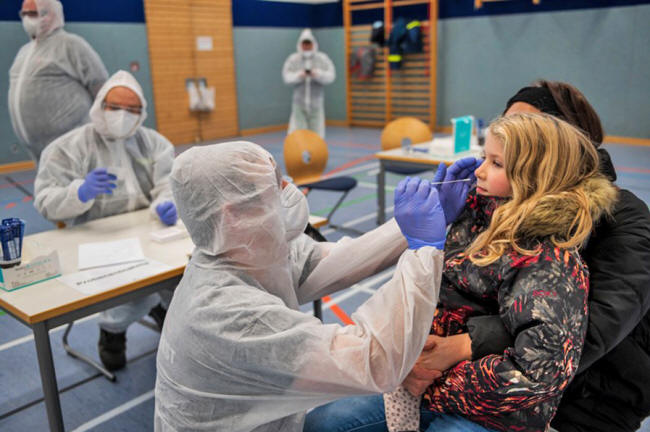|

by Bianca Nogrady
December
10, 2020
from
Nature Website

Children rarely show
symptoms of COVID-19,
even if they are infected.
Credit: Thomas Lohnes/Getty
Childrens' untrained immune response
seems to be key to eliminating
SARS-CoV-2...
Young children account for only a small percentage of
COVID-19
infections 1 - a trend that has puzzled scientists.
Now, a growing
body of evidence suggests why:
kids' immune systems seem better
equipped to eliminate SARS-CoV-2 than are adults'.
"Children are very much adapted to respond - and very well equipped
to respond - to new viruses," says Donna Farber, an immunologist at
Columbia University in New York City.
Even when they are infected
with SARS-CoV-2, children are most likely to experience mild or
asymptomatic illness. 2
Another clue that children's response to the virus differs from that
of adults is that some children develop COVID-19 symptoms and
antibodies specific to SARS-CoV-2 but never test positive for the
virus on a standard RT-PCR test.
In one study, three children under
ten from the same family developed SARS-CoV-2 antibodies 3 - and two
of them even experienced mild symptoms - but none tested positive
on RT-PCR, despite being tested 11 times over 28 days while in close
contact with their parents, who had tested positive.
Quick response
Their immune system sees the virus,
"and it just mounts this really
quick and effective immune response that shuts it down, before it
has a chance to replicate to the point that it comes up positive on
the swab diagnostic test", says Melanie Neeland, an immunologist who
studied the family, at the Murdoch Children's Research Institute in
Melbourne, Australia.
Even in children who experienced the severe but rare complication
called multisystem inflammatory syndrome in response to SARS-CoV-2
infection, studies report that the rate of positive results on
RT-PCR range from just 29% to 50%. 4,5,6
Donna
Farber says the types of antibody children develop offer clues about
what is going on.
In a study 7 of 32 adults and 47 children aged 18
or younger, she and colleagues found that children mostly produced
antibodies aimed at the SARS-CoV-2 spike protein, which the virus
uses to enter cells.
Adults generated similar antibodies, but also
developed antibodies against the nucleocapsid protein, which is
essential for viral replication.
Farber says the nucleocapsid
protein is typically released in significant quantities only when a
virus is widespread in the body.
The kids lacked nucleocapsid-specific antibodies, which suggests
that they aren't experiencing widespread infection, says Farber.
Children's immune responses seem to be able to eliminate the virus
before it replicates in large numbers, she says.
Adaptive vs. innate immune system
Farber suggests that the reason children can neutralize the virus is
that their T cells are relatively naive.
T cells are part of the
body's adaptive immune system, which learns to recognize pathogens
it encounters over a lifetime. Farber says that because children's T
cells are mostly untrained, they might have a greater capacity to
respond to new viruses - a phenomenon she is studying in more
detail.
But other evidence suggests the situation is not so straightforward:
a study 8 of people with COVID-19 that included 65 children and young
people under the age of 24, along with 60 adults, found that the
adults had a stronger T-cell response to the virus spike protein
than did the children and young people.
But Farber says the study
measured memory T-cell responses, which are much less developed in
children, rather than naive T-cell activity.
Children's ability to neutralize the virus might also be linked to
the fact that they have a strong innate immune response from birth,
says Alasdair Munro, who studies paediatric infectious diseases at
University Hospital Southampton, UK.
"There's been some suggestion
that the rapidity and scale of their innate immune response might be
protective against the initiation of infection," he says.
But this
effect is difficult to study, and raises the question of why it
isn't seen with other viruses that can cause severe disease in
children, he says.
Other factors
Children are also the main reservoir for seasonal coronaviruses that
cause the common cold.
Some researchers have suggested that
antibodies for these coronaviruses might confer some protection
against SARS-CoV-2, but the evidence is mixed, 9,10 says Munro.
Meanwhile, there is evidence that when children are exposed to the
virus, they receive a smaller dose than adults, because their noses
contain fewer ACE2 receptors, 11 which the virus uses to gain access
to cells.
This might also explain why COVID-19 is less prevalent in
children than in adults, say researchers.
Munro says it is unlikely that there is a single explanation for why
COVID-19 seems to affect children less than adults.
"Biology is rarely so
straightforward."
References
-
Wu, Z., McGoogan, J. M. J. Am. Med. Assoc. 323,
1239–1242 (2020).
-
Dong, Y.
et al. Pediatrics 145, e20200702 (2020).
-
Tosif, S.
et al. Nature Commun. 11, 5703 (2020).
-
Dufort, E.
M. et al. N. Engl. J. Med. 383, 347–358
(2020).
-
Feldstein,
L. R. et al. N. Engl. J. Med. 383,
334–346 (2020).
-
Whittaker,
E. D. et al. J. Am. Med. Assoc. 324,
259-269 (2020).
-
Weisberg,
S. P. et al. Nature Immunol. https://doi.org/10.1038/s41590-020-00826-9
(2020).
-
Pierce, C.
A. et al. Sci. Transl. Med. 564,
eabd5487 (2020).
-
Ng, K. W.
et al. Science https://doi.org/10.1126/science.abe1107
(2020).
-
Huang, A.
T. et al. Nature Commun. 11, 4704
(2020).
-
Bunyavanich,
S., Do, A. & Vicencio, A. J. Am. Med. Assoc. 323,
2427-2429 (2020).
|


